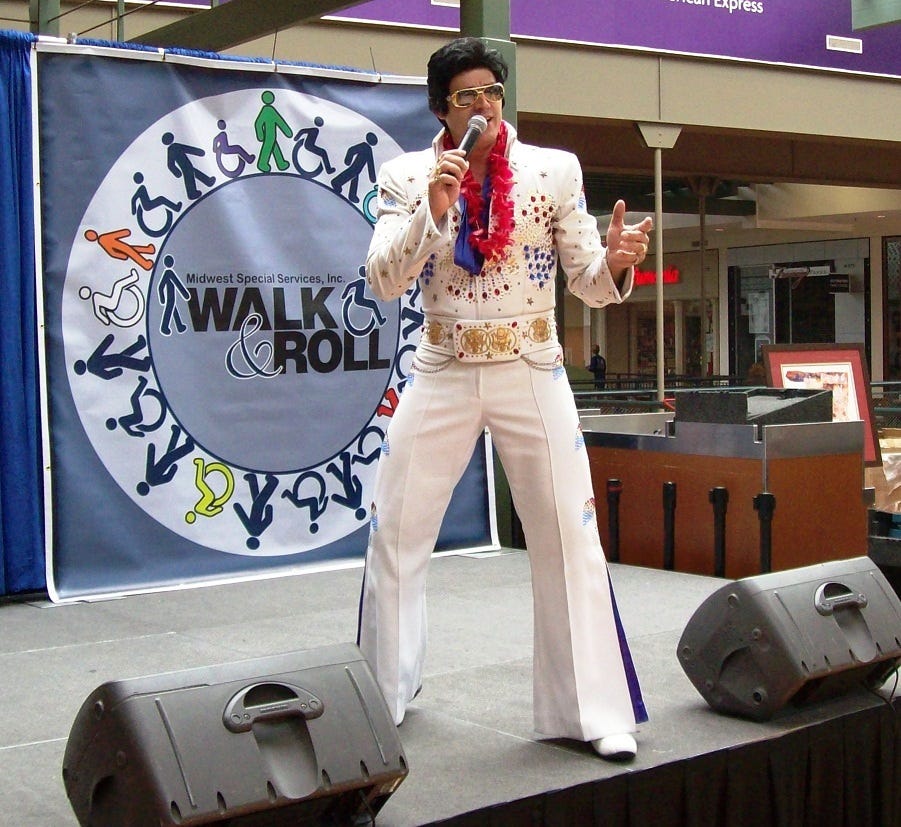Impersonating Famous Musicians: A Two Thousand Year History
From Orpheus to Elvis and beyond
Las Vegas wedding chapels recently received an unusual letter. It contained a cease-and-desist order—demanding that they stop using Elvis Presley impersonators to conduct marriages.
The Honest Broker is a reader-supported guide to music, books, media & culture. Both free and paid subscriptions are available. If you want to support my work, the best way is by taking out a paid subscription.
This sent shivers of fear down the jumpsuit-clad spines of chapel proprietors. But few had more anxiety than Kent Ripley. He not only works as an Elvis impersonator, but even runs the Elvis Chapel. He had just started to see his business bounce back from the pandemic, when Authentic Brands Group (owner of Presley’s trademark and image) cracked down on his most marketable talent.
Ripley tried reaching out to the company, but with no luck. “I made an attempt,” he told a news reporter. “I have received no phone calls back.”
Weddings are a billion dollar business in Vegas. I don’t have statistics on Elvis-sanctioned nuptials, but they must rank up there with the other major denominations.
My basic philosophy is live and let live, and what Elvis has joined together, let no corporation put asunder. But I don’t think IP law works that way.
And if you can’t get the King for your wedding, there aren’t many other celebrity options.
Sure, there’s no real reason why a Bob Dylan impersonator can’t mumble out your vows, or a faux Madonna count out the rosary beads like a prayer while you tie the knot. But those things just aren’t comme il faut. They don’t have the gravitas and longstanding tradition of the Elvis wedding, which dates back to 1977.
That’s almost as old as Scientology and Lifespring—and with much better music.
I won’t get involved in the legal niceties here, but I seriously doubt any law firm is powerful enough to stop Elvis impersonation. Fake artists are as old as music itself.
Some of you might be aware of my research into the myth of Orpheus (and here too)—whose music was so charming that he even used it to bring his wife back from the dead. Few musicologists take this myth seriously, but they really should. The same story is told all over the world—in Europe and Asia and Africa, and among more than a hundred or so Native American tribes, each with a similar tale and tradition. This story launched a cult so powerful in the ancient world that you might even call it a musical religion.
But one of the key parts of this religion was the fact that believers frequently pretended that they were Orpheus themselves. This infuriates scholars, who see all these songs attributed to Orpheus, and complain bitterly about the confusion they create.
They want to dismiss the phenomenon as plagiarism and muddled thinking. But they miss the key point—namely, that music was magic back in those days (it still is, in my opinion), and you captured its power by imitating the musician.
It was just like the Elvis marriage—even to the point of sanctifying important rituals.
Something similar happened in Egypt. In The Egyptian Book of the Dead, the deceased is often referred to as the Osiris—the god of both fertility and the Underworld, who also had powerful hymns. To gain the power of Osiris, you took on his identity.
People still do that today—but they don’t wait for the afterlife. They pretend to be a rock star for the power it gives them. Not just to perform wedding ceremonies, but to pick up partners at the cocktail lounge or get a better table at an exclusive restaurant. In some instances, wannabe rockers even undergo plastic surgery to make their impersonation all the more convincing.
From the very start, something similar happened in Western classical music. During most of the medieval era, composers were anonymous. But as soon as the first celebrity musicians emerged in Europe, imitators began showing up. So many fake compositions were attributed to Josquin des Prez (1450-1521) that one commentator quipped: “Now that Josquin is dead, he is putting out more works than when he was still alive.”
I’ve never found a genre or musical idiom that didn’t practice this kind of plagiaristic imitation. Consider the extreme case of the blues. Rock stars have often been criticized (and rightly) for stealing music from blues musicians. But these blues musicians stole from each other with even greater boldness—so much so that it’s hard to trace the lineage of many famous blues songs.
You might even say that this practice is what made the blues a genuine tradition—artists preferred to take something pre-existing, and maybe change a few tiny details, rather than invent a new song from scratch. And we can’t really complain, because this is what allows oral traditions to last over the generations. Many of these blues songs would have disappeared if somebody hadn’t stolen them.
But in the 20th century, these practices began looking odd, perhaps even illegal. Consider the peculiar case of Sonny Boy Williamson.
If you ever hear blues fans discuss this artist, you will note that they need to explain whether they are referring to the first Sonny Boy, or the second Sonny Boy. You might assume this is like the Kings of France, with son succeeding the father—but we actually have a case more like the Elvis impersonators above.
The original Sonny Boy Williamson really was named Williamson, and flourished as a blues harmonica player in the 1930s and 1940s. But around 1941, harmonica player Aleck Miller started using the same name. This couldn’t be mere coincidence. The original Sonny Boy Williamson was already well known with successful recordings from a major label.
Adding one final stab of irony, a third harmonica player also started performing as Sonny Boy Williamson—let’s call him Sonny the Third. Even the usurpers get usurped, at least in the world of blues music.
But back in those pre-Internet days, multiple musicians could tour simultaneously with the same name—and who would ever know? In some instances, bandleaders even put multiple orchestras on the road at the same time. Lester Lanin’s sweet bands were in such demand, he could take conflicting gigs and provide entertainment at both.
Fake musicians are more careful nowadays, and usually make clear that they are merely tribute acts. But as late as the 1960s, a group of imposters toured as the Beatles in South America. This phony group was so popular it even performed on television in Argentina.
But this turned into a disaster. As soon as the cameras focused on the four young men, discerning fans could tell that they weren’t the lads from Liverpool.
The con artists were now caught. But the band stayed together for a while longer, and even appeared on the TV show American Bandstand in June 1964 under the name Beetles. Then, like real insects from the order Coleoptera, they crawled back under some rock, giving the victory to a better foursome.
I’m sure a few bold liars are still out there pretending they are rock stars. But they can’t push it too far—otherwise they will get caught. But fake artists still exist, albeit with different strategies.
In fact, there’s a huge fake artist scandal underway right now, but it looks like it was invented by huge corporations to retain a disproportionate share of royalties. Under this scenario, the ultra-wealthy CEOS of tech platforms are destined to replace Elvis impersonators and the other fake artists of the past.
For my part, I liked it better when the phonies simply played a harmonica or strummed a guitar. And if it were up to me, I’d leave the Elvis weddings alone, and send a cease-and-desist order to those corporate folks instead.





Considering the topic. I think this You Tube clip might lighten every boy's day.
A disguised Adele entering Adele impersonators auditions.
https://www.youtube.com/watch?v=OHXjxWaQs9o
I never had any desire to be an Elvis impersonator, but to help my veterinarian sister’s practice out in the local small town parade, I agreed to be “Mongrelvis”, half dog, half the King of rock-n-roll singing “Hounddog”, of course. I found out first hand the power of impersonation and Elvis’ persona. Just being half Elvis was more than enough to draw people instantly in. It was rare not to get at least a smile. I finally understood the allure of donning the white jumpsuit.